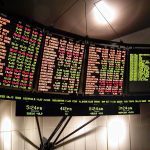The fees associated with buying and selling securities have a direct affect on the success or failure of an investment. For every form of investment, there is an accepted fee arrangement. For stock investment, fees are usually calculated according to the stock price and the number of stocks ordered. Bond transactions are usually charged for two fees – a commission and a markup.
Stocks
A purchase fee accompanies every stock purchase. The fee depends on the stock price and the number of shares ordered. The larger the dollar value of the deal is, the lower the fees are as a percentage of the overall purchase. Discount and online brokers often charge a flat fee regardless of the order size.
Sometimes, the fee is calculated only according to the number of shares ordered. For example, the fee might be three cents a share, to a maximum of 10,000 shares. In such a case, the fee as a percentage of the transaction depends on the share price. The larger the share price is, the cheaper the fee effectively is.
Bonds
Bond purchases usually get charged two different fees:
- A broker charges a Commission if he needs to turn to a third party to buy the requested bond. If the broker already holds bonds of the ordered type, he won’t charge a commission.
- The Markup is already included in the price that the broker offers. This fee can differ significantly from broker to broker.








